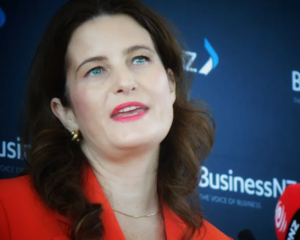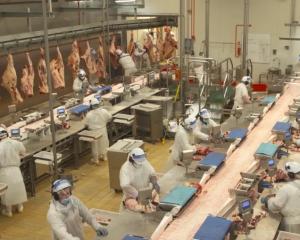Cutting overcapacity in the meat industry is the ''wrong argument'', and instead the sector needs to grow and fill global markets, Federated Farmers meat and fibre chairwoman Jeanette Maxwell believes.
Rural media was ''abuzz'' with negative news, reflected in the rural lobby organisation's soon-to-be released mid-season farm confidence survey, Mrs Maxwell said.
Some farmers were getting returns for prime breeding ewes that were 50% down on the corresponding time last year. It was experiences like that which had generated a lot of comment about the need to cut overcapacity.
Mrs Maxwell urged farmers to support the $65 million Collaboration for Sustainable Growth programme announced this week, saying it could ''supercharge'' New Zealand's red meat exports.
Up to $32.4 million from the Ministry for Primary Industries' Primary Growth Partnership Fund (PGP) has been approved for the programme, while Beef and Lamb New Zealand is seeking farmer support to invest up to $2.8 million per annum over seven years.
Growing and filling global markets would, in turn, create an industry that young people aspired to, Mrs Maxwell said. Sheep and beef farmers sorely needed better returns to create sustainable and viable businesses. At times, revenue had ''seemingly resembled an oscillograph'', she said. While there was international demand for red meat, the problem was realising that as returns that farmers and the country needed, she said.
In the year to December 2007, red meat exports represented about 58% of dairying's export value, but in the year to December 2012, that figure had fallen to 45%.
''If we had kept up the percentage recorded in 2007, our exports would be some $1.4 billion greater. That difference is more than what the entire fishing industry earns so this Collaboration for Sustainable Growth PGP stacks up, whichever way you look at it,'' she said.
There was a ''who's who'' of the processing sector engaged in the initiative, with ANZ Bank, Deloitte and Rabobank also signed up. With six meat processors involved, it showed a willingness on their part to see some change and she believed it was a ''huge opportunity''.
Richard Strowger, who is on Federated Farmers' national meat and fibre executive and is also North Otago Federated Farmers president, said such initiatives were needed to put profitability back into the red meat industry.
Alliance Group chief executive Grant Cuff said the new co-ordinated collaborative initiative would enhance the knowledge and capability in the sheep and beef sector and help improve farm performance, productivity and profitability.
The initiative was an important step in the implementation of the red meat sector strategy and Alliance was supportive of ''any steps to lift the industry's game and improve on-farm profitability''.
The red meat sector strategy, initiated by the Meat Industry Association and Beef and Lamb NZ and released in 2011, aimed at improving the sector's viability and increasing its earnings from $8 billion to $14 billion by 2025.












